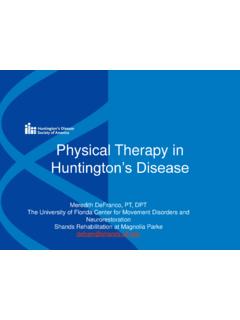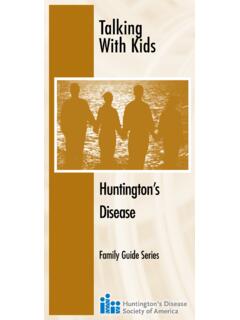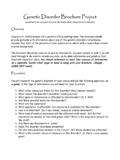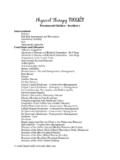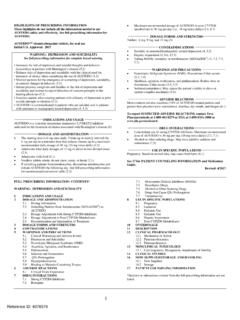Transcription of A Caregiver’s Guide to Huntington’s Disease
1 A Caregiver's Guide to huntington 's Disease March 2011 A Caregiver's Impulse Irritability and Guide to Managing Emotional Outbursts and huntington 's Avoiding a Navigating the Disease Working Successfully with Medical Keeping Track The Care Introduction to Caring for the Caregiver Respite and What is huntington 's Disease (HD)?..3 The Genetics of Respite Onset and Treatment of Choosing a Source of Respite Symptoms of Joining a Support Sources for Support After the Preparing for Late-Stage Team-based Out-of-Home The Multidisciplinary Living Wills and Advance Medical Power of Movement Disorder Tube Feeding and Hospice Poorly Coordinated or Poorly Controlled Abnormal Walking and Problems with Hope for the Living with the Movement Safety Modifications in the Acknowledgements we move and the huntington 's Disease Society of America recognize the
2 Following people for their contributions to the vision and creation of this booklet: Nutrition and Medical Reviewer Samuel A. Frank, md Making Eating Assistant Professor of Neurology, Boston University; Attending Physician and Director of the Dystonia and huntington 's Disease Clinic, Boston Veterans Nutrition in Late-Stage Administration Hospital; Consultant Neurologist, Tewksbury State Hospital, Director huntington 's Disease Clinic Cognitive Medical Writers K. aren Tarapata | Catherine F. Murray, nasw, cse Attention and Memory and New Content Reviewer Debra Lovecky, Director of Education, Programs and Services, Fixed Ideas and huntington 's Disease Society of America Lack of Awareness of Editors Joy B.
3 Leffler, mla, nasw, Director of Education & Informatics, we move Caregiving and Cognitive Judith Blazer, ms, Executive Director, we move we move and the huntington 's Disease Society of America wish to acknowledge Behavioral Lundbeck, Inc. for providing the funding to create and distribute this publication to the hd community. A Caregiver's Guide to huntington 's Disease | WE MOVE | MARCH 2011 2. Introduction to 50/50 chance of being free of the Disease . If children are free of the Disease , they can never pass it on. hd does not skip Caregiving and HD generations.
4 The Disease affects males and females equally. hd can be passed down from either the mother or father. If someone you care about has been diagnosed with There is a genetic test which can show whether a person has huntington 's Disease (hd), this Guide has been written for you. the expanded gene that will cause hd. Your loved one may have had this test to confirm his or her diagnosis of hd. In these pages, we will cover some of the major symptoms of hd and how the symptoms will change over time. We If the test has not yet been performed, or if a test is will also offer suggestions and strategies for coping with the being considered for another family member, it is highly daily challenges presented by hd.
5 We have drawn from the recommended that a genetic counselor and neurologist experiences of countless other hd families and the medical familiar with hd be consulted before moving ahead. The professionals who serve them. As a caretaker, you have an decision to test is highly personal and complicated. Because essential role to play in your loved one's life and care. This there is no cure for hd at this time, many people at-risk for Guide was developed to help support you during the journey the Disease choose not to be tested.
6 That is hd. Just as importantly, this Guide will help you to connect with the informed, welcoming community of hd professionals and Onset and Treatment of HD. families that you can turn to for support. What is called the onset of hd occurs when the expanded gene begins to trigger changes to the brain and the person shows outward signs of the Disease . Exactly how, why and when this happens is the subject of intensive, ongoing research. At this time, there is no cure or treatment that will halt the What is HD? progression or delay onset of hd, but there are medications and therapies which may relieve some symptoms in certain huntington 's Disease (hd) is a hereditary brain disorder.
7 Individuals. These will be discussed throughout the Guide . Symptoms usually appear in the prime of life, between ages 30. and 50, but there have been individuals affected by the Disease as young as two or as old as 80. hd causes widespread physical and mental disabilities that become more and more severe over a long period of time, up to 20 years or more. The Genetics of HD. People sometimes refer to the hd gene.. huntington 's Disease is not a gene, but a change in one of the genes that every human being is born with. Only people who are born with this genetic abnormality (also called a gene expansion) can develop huntington 's Disease .
8 Unlike viruses (like hiv or the flu ), no one can catch hd from another person. If an individual has been diagnosed with hd, they inherited the expanded gene from a parent. Each child of a parent with hd has a 50% chance of inheriting the genetic change that causes the Disease . This means that within a family with hd, each child has the same A Caregiver's Guide to huntington 's Disease | WE MOVE | MARCH 2011 3. Symptoms of HD Team-Based Care The most obvious symptom of hd is chorea involuntary tics, twitches and jerky movements that flow between body The Multidisciplinary Team parts.
9 But the movement disorder is only one aspect of the hd is a complex brain disorder that affects all aspects of Disease . The progressive loss of nerve cells in the brain affects life. Providing the best care for a person with hd takes the not only movement, but also the capacity to control emotions expertise of many professionals in different areas of medicine and behavior, as well as the ability to think and reason. and healthcare. Disabilities in one area will have an impact on other areas. hd Your loved one may already be seeing a neurologist, is a Disease that affects the entire person.
10 Psychiatrist or physician who specializes in brain disorders as part of the diagnostic process. Over the course of the Disease , this doctor (also called the primary managing physician) may General Symptoms of HD Include: need to call upon other medical specialists and allied health 3 Unsteady gait and involuntary movements. professionals to address the treatable symptoms of hd. As 3 Clumsiness and difficulty with voluntary movements. the caregiver, you may be the one to ask the doctor to make referrals for your loved one. 3 Slurred speech and difficulty in swallowing.

